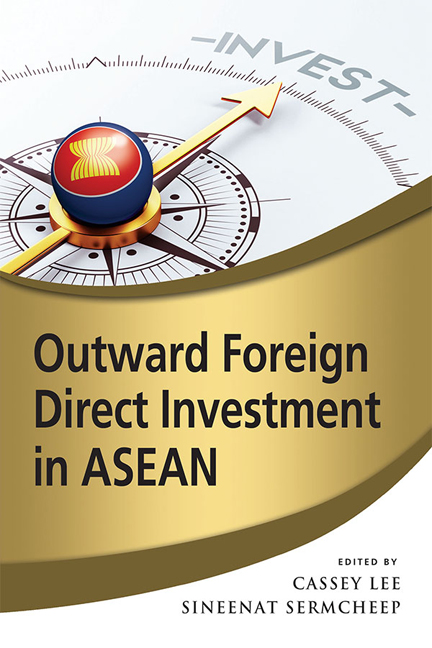Book contents
- Frontmatter
- Contents
- List of Tables
- List of Figures
- Foreword
- About the Contributors
- Introduction
- 1 The Rise of Outward Foreign Direct Investment from ASEAN
- 2 ASEAN's Outward Foreign Direct Investment
- 3 The Impact of the ASEAN Economic Community on Outward FDI in ASEAN Countries
- 4 Determinants of Singapore's Outward FDI
- 5 Outward Foreign Direct Investment from Malaysia
- 6 Indonesia's Outward Foreign Direct Investment
- 7 Factors Influencing Thailand's Outward FDI
- 8 Outward Foreign Direct Investment: The Case of Vietnam
- 9 Myanmar as a Destination for OFDI: A New ASEAN Foreign Investment Frontier
- Index
7 - Factors Influencing Thailand's Outward FDI
Published online by Cambridge University Press: 19 May 2017
- Frontmatter
- Contents
- List of Tables
- List of Figures
- Foreword
- About the Contributors
- Introduction
- 1 The Rise of Outward Foreign Direct Investment from ASEAN
- 2 ASEAN's Outward Foreign Direct Investment
- 3 The Impact of the ASEAN Economic Community on Outward FDI in ASEAN Countries
- 4 Determinants of Singapore's Outward FDI
- 5 Outward Foreign Direct Investment from Malaysia
- 6 Indonesia's Outward Foreign Direct Investment
- 7 Factors Influencing Thailand's Outward FDI
- 8 Outward Foreign Direct Investment: The Case of Vietnam
- 9 Myanmar as a Destination for OFDI: A New ASEAN Foreign Investment Frontier
- Index
Summary
INTRODUCTION
Inward foreign direct investment (FDI) has been one of the important driving forces for Thailand's economic growth during the last few decades. Thailand is an important production and assembly base in Southeast Asia for many industries such as automobiles and hard disk drives. The country has attracted tremendous investments from multinational enterprises based in developed countries such as Japan, the European Union, and the United States. FDI was a crucial factor behind the miraculous economic growth in Thailand and East Asian countries during the 1990s (Jansen 1995; Chen and De Lombaerde 2009). The more recent study by Cheewatrakoolpong and Sabhasri (2012) showed that FDI from developed countries leads to technology transfers and knowledge spillovers as well as promoting employment, productivity and international trade in Thailand.
Given Thailand's status as a middle-income country with significant inward FDI, what explains outward FDI (OFDI) from Thailand? The goal of this study is to examine the factors influencing Thailand's OFDI. It analyses the determinants of Thailand's OFDI in ASEAN-5 and CLMV countries. In addition, this study also investigates the opportunities and effects of adopting ACIA on Thai economy. Finally, this study will consider two case study sectors, namely food processing, and textile and garments. Both are among the prioritized sectors for Thailand's OFDI.
OFDI AND THE FLYING GEESE THEORY
Kojima (1975) proposed the “Flying Geese Theory” to explain Japan's OFDI in the region. The theory attempts to explain Japan's OFDI into the newly industrialized countries such as Singapore, Hong Kong, South Korea and Taiwan in the 1960s. In the more recent study, Aminian, Foong and Hitomi (2007) have argued that the cost of production has increased in Singapore, Hong Kong, South Korea and Taiwan. This has led to a loss of competitive advantage which could have resulted in investment being relocated to countries with lower cost of production such as Malaysia, Thailand and Indonesia. Hiratsuka (2006) has argued that the flying geese theory can be used to explain the recent OFDI in Malaysia, Thailand and Indonesia.
- Type
- Chapter
- Information
- Outward Foreign Direct Investment in ASEAN , pp. 152 - 179Publisher: ISEAS–Yusof Ishak InstitutePrint publication year: 2017

